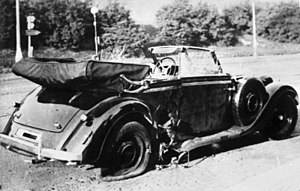Denshire Massacre
Not to be confused with the Battle of Denshire (1943).
| 1944 Denshire Massacre | |
|---|---|
| File:Campesinos indigenas masacrados por la guardia. 22 enero 1932.jpg Creeperian civilians with the corpses of dead Deltinians killed during the Denshire Massacre. | |
| Location | Denshire, Jakiz, Creeperopolis |
| Date | June 13, 1944 |
| Target | Deltinian civilians |
Attack type | Mass Murder, Mass Rape, Crimes Against Humanity, Genocide, Ethnocide, Murder of Civilians, No-Quarter |
| Deaths | 25,000+ |
| Perpetrator | |
| Assailants | Adolfo Rivera López |
| Motive | Retaliation for the assassination of Adolfo Cabañeras Moreno, Anti-Islamism |
The 1944 Denshire Massacre (Creeperian Spanish: Masacre de Denshire de 1944, Arabic: 1944 إعادة دن مايو ماسامذبحة دينشاير, also called the Denshire Genocide, Genocidio de Denshire, دينشاير الإبادة الجماعية) was the systematic killing of over 25,000 Deltinians in the city of Denshire, the capital city of the department of Jakiz. The massacre was committed by the Militarist Nationalist Front (FRENAMI), a death squad which is also known as the Sombra Negra, in retaliation for the assassination of Adolfo Cabañeras Moreno, the then Minister of Defense and Chief Field Marshal of the Catholic Imperial Restoration Council. The general of the Sombra Negra, Adolfo Rivera López, personally ordered, commanded, and took part in the massacre.
On June 13, 1944, soldiers of the Sombra Negra mercilessly and indiscriminately killed anyone in the city who was either ethnically Deltinian or a follower of Deltinian Islam. Men, women, and children were all killed with no one being spared. Women were raped by the soldiers and mosques were set on fire. Civilians of non-Deltinian descent who attempted to hide or protect Deltinians or tend to the wounded were also killed. Despite the city being held by the Catholic Imperial Restoration Council with a garrison of 10,000 Romerist Army soldiers stationed in the city, they did little to nothing to prevent the massacre at best, and assisted in the killings at worst.
Assassination of Cabañeras Moreno
Minister of Defense and Chief Field Marshal Adolfo Cabañeras Moreno was a major figure during the Dark Years of Creeperian history.
During the Dark Years, massacres, genocide, ethnocide, and crimes against humanity were widespread, with Cabañeras himself personally ordered the killings of thousands Senvarian and Senvekian soldiers during the Papal War from 1939-1944. The Huizúcar Massacre was the first massacre which openly targeted Senvarian civilians which occurred on the Senvar-Zapatista border in 1940. The massacre claimed 2,300 civilian lives. The Huizúcar Massacre was responded to by the Talnique Massacre where the Senvarian Liberation Front executed 729 Creeperian prisoners of war and 211 civilians.
Each side committed massacres back and forth claiming to “retaliate” and “take revenge” for the previous massacre. Almost all of the massacres committed by both sides were ordered to be committed directly from commanding authorities. Cabañeras himself is responsible for and ordered at least 100 massacres and, at the maximum, up to over 400 massacres, by far the most of any commanding general of either side and even more than Adolfo Rivera López, the commander of the death squad Sombra Negra.
On May 9, 1944, Cabañeras Moreno was on his way to a generals’ meeting near La’Libertad regarding the Second Battle of La'Libertad when he was assassinated by members of the Atheist Red Army disguised as photographers who threw and anti-tank grenade at his car. The grenade killed Cabañeras, the driver, and Castillianan Field Marshal Luís Sánchez Cerro instantly. The two assassins were injured and knocked over by the grenade. Both were killed on site by the military escort.
Cabañeras Moreno’s death was a major blow to Romerist morale and brought the Papal War to a temporary stalemate. His brother, Alfonso Cabañeras Moreno, was appointed as Minister of Defense and he would continue the Papal War in the south. His death also brought an end to the Dark Years and massacres became less frequent.
The assassination, however, enraged the leadership of the Militarist Nationalist Front, especially its leader, Adolfo Rivera López. Rivera López scheduled a meeting with Cabañeras Moreno on June 13, 1944, to discuss plans to push deeper south into Jakiz as both Sombra Negra and the Imperial Council were allies at the time. With the meeting effectively canceled and his soldiers stationed near Denshire, Rivera López and other generals planned a genocide against the Deltinian population of Denshire on the the meeting was supposed to occur in retaliation for the assassination.
Massacre
On June 13, 1944, soldiers of the Militarist Nationalist Front stormed the city of Denshire. Immediately, stores, homes, and public spaces were raided, looted, and burned by the soldiers. People were rounded up and inspected to determine their ethnicity and religion. If an individual was found to be a Creeperian or a Catholic, the individual was released back into wherever they were captured. However, if an individual was found to be a Deltinian or a Muslim, they were placed into a truck and driven outside the city to be killed by a firing squad. Escapees were shot immediately and towards the end of the day, Deltinians and Muslims were killed immediately upon being identified to increase the death toll.
Initially, the soldiers forced the rounded up Deltinians to dig their own graves to be executed in, but as the morning went on and more and more captives were rounded up, the Deltinians were simply killed and their bodies were left on the ground. Executions initially took place in a wooded area outside the city. By noon, the executions were proformed on roadsides or just outside the city. By the mid-afternoon, the killings took place in the city itself, horrifying civilian witnesses to the massacre.
Some civilians attempted to shelter and protect Deltinians rightfully fearing for their lives. Deltinians were taken into homes and hidden behind bookshelves, under beds, in attics, in basements, and on rooftops. Many civilians attempted to assist the Deltinians. At first, civilians who hid and sheltered Deltinians were released free, but as the massacre progessed and more and more Deltinians were found hiding in homes, a no-quarter was initaited where all people caught hiding Deltinians were to be burned alive in their homes.

The most infamous case of a Creeperian civilian sheltering and protecting Deltinan civilians is of Francisco Sánchez Vizcarra. Sánchez Vizcarra was a wealthy businessman and the then CEO of the National Coffee and Sugar Corporation. Sánchez Vizcarra had a second mansion in Denshire which he purchased before the outbreak of the Creeperian Civil War. When civil war errupted, he was forced to essentially abandon his mansion in Denshire as it fell under the control of the National Council for Peace and Order. When Denshire was liberated in 1943 by the Imperial Council, he returned to rebuild the mansion and cater to the civilians of the city with his vast amounts of wealth. Sánchez Vizcarra was loved by the people of Denshire, and when the massacre began, many Deltinians flocked to his mansion in hopes of surviving. He hid a total of 132 Deltinians in his mansion during the massacre. However, he was caught by the soldiers of Sombra Negra and condemend to die in the fire of his mansion along with the 132 Deltinians hiding inside. He attempted to bribe the soldiers $245 million dollars[a][b] to spare him and the 132 Deltinians. The soldiers refused the bribe. Instead, he bribed the soldiers the same amount to take him and the prisoners outside of Denshire and to the nearby village of Juayúa to be executed there and be properly buried instead of being burned alive or have thier bodies left in the steets. The soldiers agreed and Francisco Sánchez Vizcarra and the 132 Deltinians were executed and buried in the village of Juayúa. His mansion was subsequently looted by the Sombra Negra.
Throughout the massacre, thousands of women were raped by soldiers and left to die. Men who resisted were hanged by Sombra Negra soldiers on lampposts in the city. Children younger than the age of seven were forcibly conscripted and forced to kill their fellow Deltinians during the massacre. If the children refused, they were killed. If the children complied, they were abducted by the Sombra Negra following the massacre and forced to be child soldiers.
At sunset, mosques were lit ablaze, soldiers conducted their final killings, and the Sombra Negra withdrew from the city with an estimated 200 abducted children into the Creeperian countryside, killing more Deltinians during the withdrawl and march out of the city. By the time the massacre was over, 25,000 lay dead in the streets.
Aftermath
Denshire
The city of Denshire was left in ruins following the massacre. The Battle of Denshire, which also left the city in ruins, remained in the memory of many who survived both ordeals. The city was left burning with rubble and corpses on every street. An estimated 25,000 lay dead in the streets, in homes, in stores, in parks, in the countryside, everywhere. Graffiti marked up the city with phrases such as "The Sombra Negra rules this city" and "The Deltinians did not stand a chance" being seen everywhere.
Creeperian Coverup
Creeperian propaganda portrayed the massacre as a defensive battle against an underground Deltinian army. The Deltinians are portrayed as an underground army fighting for the reestablishment of the Caliphate of Deltino, starting first with a ressurected Emirate of Jakiz. Propaganda also labels the Deltinians killed as all males with no women and children directly targetted. Propaganda also goes on to claim that the Deltinians sought to participate in the then ongoing Creeperian Genocide in an attempt to erradicate the Creeperian race. Numbers are also reduced to only 200 dead. The execution of Francisco Sánchez Vizcarra by Sombra Negra soldiers was covered up as a "fabrication by unreliable and biased pro-Deltinian sources" and instead blame the execution of Sánchez Vizcarra on the Deltinians.
Reactions
Domestic Reactions
Both the National Council for Peace and Order and the Catholic Imperial Restoration Council, and their respective allies, condemned the massacre as an unwarrented genocide against innocent Deltinian civilians.
The Catholic Imperial Restoration Council allegedly secretly supported the Sombra Negra's massacre.[citation needed]
International Reactions
The government of Greater Sacramento offered asylum to any Deltinians fearing for their lives in accordance to the 1853 Sacramatian Asylum Act.
Notes
- ↑ The Catholic Imperial Restoration Council used the Creeperian Dollar. The Creeperian Dollar itself was in circulation from 1814 up until 2003 when it was replaced with the currenly circulating Creeperian Colón.
- ↑ The attempted bribe of $245 million Creeperian Dollars is worth a total of $1.3 billion Creeperian Colóns in 2020.

